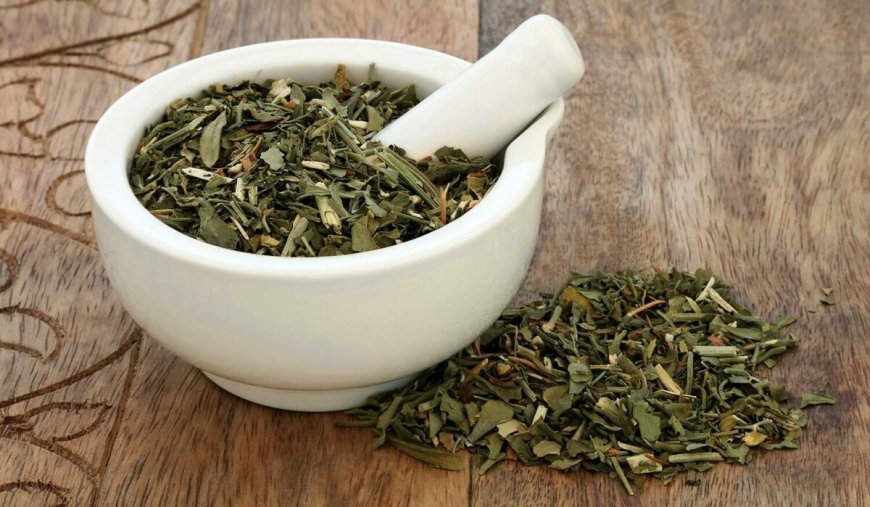How to Make Rue Tea with Dried Rue Leaves: A Complete Guide
Using dried rue leaves to make tea is a common method of reaping the health advantages of rue. This post will walk you through the steps of brewing rue tea from dried rue leaves, emphasizing its health benefits and providing some things to watch out for.

Rue (Ruta graveolens) is a traditional herb valued for its potent flavor and potent scent. It has been a longstanding component of many traditional treatments, especially in Europe and the Mediterranean region. Using dried rue leaves to make tea is a common method of reaping the health advantages of rue. This post will walk you through the steps of brewing rue tea from dried rue leaves, emphasizing its health benefits and providing some things to watch out for.
What is Dried Rue?
The dried version of the rue plant, more especially its leaves, is called dried rue. To preserve their efficacy and extend their shelf life, the leaves are dried after harvesting. Rue is frequently dried and used as an all-natural insect repellant or in tinctures and teas. Dried rue is an effective component of herbal medicines because the drying process increases the concentration of its medicinal ingredients.
Benefits of Rue Tea
Before we dive into how to make rue tea, let’s explore some of the potential benefits of this herbal infusion:
-
Digestive Aid: Rue tea can help stimulate digestion, alleviate bloating, and relieve stomach cramps.
-
Calming Effect: The herb has mild sedative properties, making it useful for reducing anxiety and promoting relaxation.
-
Menstrual Health: Rue tea is sometimes used to ease menstrual discomfort and regulate menstrual cycles.
-
Antimicrobial Properties: Rue contains compounds that may help fight infections and boost the immune system.
Precautions When Using Dried Rue
Although rue has many benefits, it’s important to use it cautiously:
-
Toxicity: Rue contains compounds that can be toxic in large amounts. Always use the recommended dosage and consult with a healthcare provider before use, especially if pregnant or breastfeeding.
-
Skin Sensitivity: Handling rue can cause skin irritation or photosensitivity. Wear gloves when working with fresh or dried rue.
-
Bitter Taste: Rue tea has a very strong and bitter flavor. You might want to mix it with other herbs or sweeten it with honey to improve its taste.
How to Make Rue Tea with Dried Rue Leaves
Let's begin by going over the steps involved in creating rue tea using dried rue leaves, now that you are aware of the advantages and safety measures.
Ingredients Needed
-
1 teaspoon of dried rue leaves
-
1 cup of boiling water
-
Honey or lemon (optional, for flavor)
Step 1: Measure the Dried Rue
Start by measuring out one teaspoon of dried rue leaves. Due to rue’s potency, it's important to stick to this small amount. Using too much rue can result in a tea that's too strong and potentially harmful.
Step 2: Boil the Water
Bring one cup of water to a rolling boil. The water needs to be hot enough to extract the active compounds from the dried rue leaves.
Step 3: Steep the Dried Rue Leaves
Place the dried rue leaves in a tea infuser or directly into a cup. Pour the boiling water over the leaves, ensuring they are fully submerged. Allow the tea to steep for 5-10 minutes. The longer it steeps, the stronger (and more bitter) the tea will become.
Step 4: Strain the Tea
If you didn't use a tea infuser, you'll need to strain the tea to remove the dried rue leaves. Use a fine mesh strainer to catch all the leaves and prevent any debris from entering your tea.
Step 5: Add Flavor (Optional)
Rue tea has a strong, bitter taste that might not be pleasant to everyone. If desired, add honey, lemon, or another natural sweetener to improve the flavor. Some people also mix rue with other herbs like chamomile or mint to create a more balanced tea.
Step 6: Enjoy Your Rue Tea
Your rue tea is now ready to drink! Enjoy it slowly, savoring the herbal notes. Remember, due to its potency, it's best not to drink more than one cup of rue tea per day.
Tips for Making the Perfect Rue Tea
-
Use Fresh Dried Rue: Ensure your dried rue leaves are fresh. Over time, dried herbs can lose their potency, so it's best to use rue that has been dried and stored properly.
-
Experiment with Steeping Time: If the bitterness is too strong, try steeping the tea for a shorter period or using fewer leaves.
-
Combine with Other Herbs: To soften the bitterness, consider blending rue with other herbs like lavender, peppermint, or chamomile.
Storing Dried Rue
Proper storage of dried rue is essential to maintain its potency and flavor. Here’s how you can store your dried rue leaves:
-
Airtight Containers: Store dried rue in airtight containers to prevent moisture from getting in, which can cause the leaves to spoil.
-
Cool, Dark Place: Keep the container in a cool, dark place away from direct sunlight. This will help preserve the herb's potency for a longer period.
-
Label and Date: Always label your storage containers with the name of the herb and the date it was dried. This way, you can keep track of its freshness.
Potential Side Effects of Rue Tea
While rue tea can be beneficial, it’s important to be aware of potential side effects:
-
Nausea and Vomiting: Consuming too much rue tea can lead to stomach discomfort, nausea, or vomiting.
-
Dizziness: Some individuals may experience dizziness or lightheadedness after drinking rue tea.
-
Allergic Reactions: Rue can cause allergic reactions in some people. If you experience any itching, swelling, or difficulty breathing after consuming rue tea, seek medical attention immediately.
Frequently Asked Questions About Rue Tea
Q: Can I drink rue tea every day?
A: It’s advisable to limit rue tea consumption to occasional use due to its potency. Drinking it daily may increase the risk of side effects.
Q: Can I use fresh rue leaves instead of dried?
A: Yes, fresh rue leaves can be used, but they have a stronger flavor and may require different steeping times. Generally, dried rue is preferred for making tea due to its milder taste and easier storage.
Q: Is rue tea safe during pregnancy?
A: No, rue tea is not safe during pregnancy. Rue is known to have abortifacient properties, meaning it can induce miscarriage. Always consult with a healthcare provider before consuming rue if you are pregnant or breastfeeding.
Q: Where can I buy dried rue?
A: Dried rue can be purchased at specialty herb shops, online stores, or sometimes at farmers' markets. Ensure that the supplier is reputable to guarantee the quality of the dried rue.
Conclusion
Dried rue leaves are used to make rue tea, a powerful herbal medicine with several possible advantages. This ancient tea has been enjoyed for generations for its ability to help with digestion and induce calm. However, it's crucial to utilize dried rue sensibly because of its potent and occasionally lethal nature. You can safely take advantage of rue tea's benefits by adhering to the instructions and directions provided in this article.
Always get medical advice before adding new herbal teas to your regimen, particularly if you are taking medication or have any underlying medical conditions. Have fun with rue tea, but proceed with caution at all times!
What's Your Reaction?





















